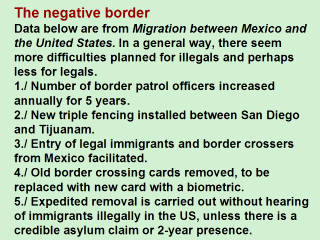| front |1 |2 |3 |4 |5 |6 |7 |8 |9 |10 |11 |12 |13 |14 |15 |16 |17 |18 |19 |20 |21 |22 |23 |24 |25 |26 |review |
 |
6./
Distinction between exclusion and deportation abolished. 7./ New areas created which have administration decisions cannot be reviewed by the courts. 8./ This includes lack of judicial review of final orders of deportation for most criminal aliens. 9./ In addition, definition of "aggravated felony" is expanded even if imprisonment is suspended. 10./ Certain legalization class action suits pending in courts are no longer subject to judicial review. 11./ Standards for suspension of deportation (now "cancellation of removal") made more restrictive and burden of hardship increased from extreme to exceptional and extremely unusual hardship and harm must be to a US citizen, legal permanent resident spouse, parent or child. 12./ Criminal penalties for immigration violations enhanced. 13./ Legal immigrants barred from usage of supplemental security income and food stamps until they obtain citizenship. 14./ Legal immigrants entering after enactment of Welfare Act barred for 5 years from most federal means-tested programs, including Medicaid. 15./ Welfare reform amended to provide certain exemptions for battered spouses and immigrant children abandoned by parents. 16./ Immigration affidavits of support raised to 125 % of poverty level and made binding on sponsors until naturalization or forty quarters of employment by sponsored alien. 17./ Aliens made inadmissible as legal immigrants for 3 years if illegally present in US for 180 days to 1 year, for 10 years if present for 1 year or more, permanently if previously convicted of an aggravated felony; plus other grounds for inadmissibility. 18./ Pilot programs to verify employment eligibility implemented. 19./ Persons unlawfully in U.S. are not eligible for social security benefits or post-secondary education. 20./ Attorney General permitted to enter into written agreements with state and local agencies to perform functions previously exclusive to federal immigration agents. After so many negatives, letís try one positive. Political empowerment is the best path for achieving objectives. This has led to an increase in citizenship applications of legal immigrants. This particularly affects legal Mexican immigrants who, as a group, have heretofore been slow to naturalize. Why have they been slow to vote, especially in California? |